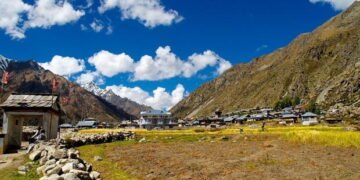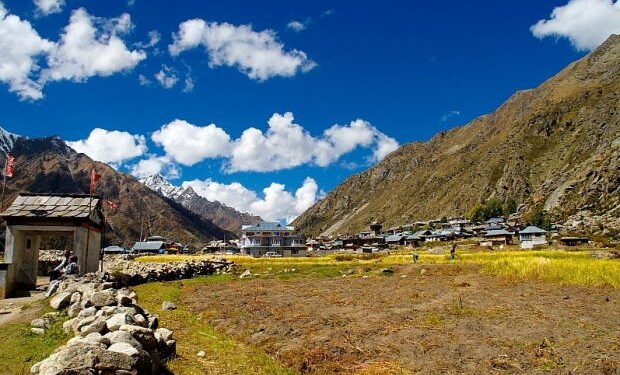**Title: Chitkul and Rakcham: Discovering the Last Villages of India in the Enchanting Sangla Valley, Himachal Pradesh**
**Introduction:**
Nestled in the lap of the Himalayas, the Sangla Valley in Himachal Pradesh unveils its hidden treasures with Chitkul and Rakcham, two picturesque villages that sit at the edge of the world. As the last villages of India before the Tibet border, Chitkul and Rakcham enchant visitors with their untouched beauty, traditional charm, and the majestic landscapes that define the Sangla Valley.
**Sangla Valley – Nature’s Canvas:**
1. **Panoramic Landscapes:**
– The Sangla Valley, also known as the Baspa Valley, is renowned for its breathtaking beauty. Surrounded by snow-capped peaks, lush meadows, and the glistening Baspa River, the valley creates a canvas that showcases the grandeur of the Himalayas.
2. **Traditional Architecture:**
– Traditional wooden houses with sloping roofs, adorned with intricate carvings, dot the landscape, adding to the valley’s timeless charm. The architecture reflects the harmony between human settlements and the natural environment.
**Chitkul – The Last Inhabited Village:**
1. **Gateway to Heaven:**
– Chitkul, situated at an altitude of around 11,320 feet, is often referred to as the “Last Inhabited Village” on the Indo-Tibetan border. The drive to Chitkul is an adventure in itself, with every turn revealing a postcard-perfect view.
2. **Baspa River Harmony:**
– The Baspa River, flowing through Chitkul, adds a musical note to the village’s ambiance. The river, with its crystal-clear waters, mirrors the surrounding mountains and skies, creating a serene atmosphere.
3. **Chitkul Temple:**
– The Chitkul Temple, dedicated to the local goddess, is a cultural centerpiece. The temple’s traditional architecture and spiritual significance make it a must-visit, offering insight into the local customs and beliefs.
**Rakcham – Tranquil Beauty:**
1. **Rural Serenity:**
– Rakcham, a quaint village located a short distance from Chitkul, embodies rural simplicity and tranquility. The village is a perfect retreat for those seeking solitude and a connection with nature.
2. **Himalayan Orchards:**
– Explore the lush apple orchards surrounding Rakcham. The terraced fields, laden with apples during the harvest season, paint the landscape in hues of green and red.
3. **Rakcham Monastery:**
– The Rakcham Monastery, with its vibrant prayer flags fluttering in the mountain breeze, offers a serene escape. The monastery’s spiritual ambiance and panoramic views make it a peaceful haven.
**Experiencing Local Culture:**
1. **Nomadic Lifestyle:**
– Encounter the semi-nomadic lifestyle of the locals, who are deeply connected to their ancestral traditions. Experience the warmth of the villagers and learn about their daily routines.
2. **Festivals and Folklore:**
– If your visit aligns with local festivals, such as the Fulaich Fair in Chitkul, immerse yourself in the vibrant celebrations. Engage with the locals, listen to folk tales, and witness traditional dances that reflect the cultural richness of the region.
**Practical Tips:**
1. **Weather Considerations:**
– Check the weather conditions before planning your visit, especially during winter when heavy snowfall may impact accessibility.
2. **Altitude Awareness:**
– Both Chitkul and Rakcham are at high altitudes. Acclimatize properly, stay hydrated, and be mindful of altitude-related symptoms.
3. **Respect Local Customs:**
– Embrace the local customs and traditions. Seek permission before entering religious sites and interact respectfully with the villagers.
4. **Pack Essentials:**
– Pack essentials like warm clothing, comfortable footwear, and a camera to capture the stunning landscapes.
**Conclusion:**
Chitkul and Rakcham, the last villages of India in the captivating Sangla Valley, offer a glimpse into the untouched beauty and cultural richness of the Himalayas. Whether you seek adventure, cultural exploration, or a retreat into nature’s embrace, these villages provide an enchanting experience that lingers in the heart, beckoning travelers to return to the tranquility of the Sangla Valley.



















